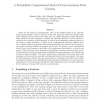948 search results - page 15 / 190 » How People use Words to Make Meanings |
IWC
2010
13 years 6 months ago
2010
In this paper a study is presented which aimed at exploring the effects of audio feedback in a haptic and visual interface supporting collaboration among sighted and people who ca...
WWW
2009
ACM
14 years 9 months ago
2009
ACM
Rich media social networks promote not only creation and consumption of media, but also communication about the posted media item. What causes a conversation to be interesting, th...
COGSCI
2010
13 years 8 months ago
2010
Words are the essence of communication: they are the building blocks of any language. Learning the meaning of words is thus one of the most important aspects of language acquisiti...
ICANN
2007
Springer
14 years 2 months ago
2007
Springer
Neurocognitive processes responsible for representation of meaning and understanding of words are investigated. First a review of current knowledge about word representation, recen...
JIRS
2002
13 years 8 months ago
2002
Disabled people assistance is developing thanks to progress of new technologies. A manipulator arm mounted on a mobile robot can assist the disabled person for the partial restora...

